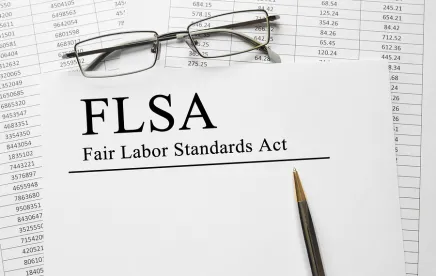For over 30 years, most district courts throughout the country have used a two-step conditional certification process to govern certification of collective actions under the Fair Labor Standards Act (FLSA). But in its recent and game-changing opinion, Swales v. KLLM Transport Services, LLC, the Fifth Circuit rejected that two-step process and laid out a stricter framework for FLSA collective actions.
Under the FLSA, a named plaintiff can bring an action on behalf of him- or herself and all other “similarly situated” individuals. Unlike Rule 23 class actions, FLSA collective actions require other employees to opt-in to the case by filing written notice with the court. As part of the opt-in process, the Supreme Court has held that district courts can authorize notice be sent to the similarly situated employees advising them of their right to join the collective action. Importantly, however, the FLSA does not define “similarly situated,” nor does it outline the certification process for determining whether a group of employees is similarly situated for purposes of facilitating notice.
In the absence of such statutory language, most district courts across the country have followed the two-step process established in Lusardi v. Xerox Corp., 118 F.R.D. 351 (D.N.J. 1987). Under the so-called “Lusardi two step,” the district court first determines whether the collective action should be “conditionally certified” based on a minimal showing that the named plaintiff is similarly situated to the other proposed plaintiffs. District courts typically make this determination early on in the litigation, prior to significant discovery and without examining the merits of the plaintiff’s claims. District courts applying this approach often decline to consider the defendant’s evidence establishing that the individuals are not, in fact, similarly situated for purposes of litigating the claims in the case, holding instead that such evidence goes to the “merits” of the claims and should instead be taken up later in the case.
Once conditional certification occurs, the named plaintiff sends out notice of the lawsuit to putative members of the collective action, who can choose to opt-in to the lawsuit. The parties then engage in discovery before the second step of the certification process occurs, at which time the defendant is permitted to file a motion for decertification. The second and final determination uses a stricter standard to determine whether the members of the collective class are similarly situated based on evidence obtained during discovery. At that point in the process, the district court evaluates all of the evidence to determine whether the claims at issue are too individualized to continue to allow the case to proceed as a collective action.
The two-step process under Lusardi often results in costly, unnecessary litigation for employers involving hundreds of individuals who are ultimately determined to not be “similarly situated” for purposes of litigating their claims on a collective action basis. Most FLSA cases are quickly conditionally certified with very little scrutiny of whether the claims can properly be litigated on a collective basis, with large numbers of additional employees notified and added to the action. That, in turn, leads to expensive class-wide discovery and motion practice, the cost of which places significant settlement pressure on the defendant no matter how meritorious the claims.
In Swales, the Fifth Circuit rejected the Lusardi two-step process on the basis that it “has no anchor in the FLSA’s text or in Supreme Court precedent interpreting it.” Among other things, the Fifth Circuit opined that the Lusardi two-step process is too lenient and “frustrates, rather than facilitates” the opt-in notice process. Rather than using a “lenient” conditional certification standard, the Fifth Circuit instead held the “FLSA’s similarity requirement is something that district courts should rigorously enforce at the outset of the litigation.” According to the Fifth Circuit, the fact that the similarly situated inquiry “is intertwined with a merits question does not itself justify deferring those questions” until later in the case.
In place of the two-step process, the Fifth Circuit provided the following instructions to district courts in evaluating whether a group of FLSA plaintiffs are “similarly situated” for purposes of sending out notice: “The district court should identify, at the outset of the case, what facts and legal considerations will be material to determining whether a group of ‘employees’ is ‘similarly situated.’ And then it should authorize preliminary discovery accordingly. The amount of discovery necessary to make that determination will vary case by case, but the initial determination must be made, and as early as possible.”
Further, the Fifth Circuit made clear that district courts must consider “all available evidence” in making the similarly situated determination, including evidence going to the merits of the plaintiff’s claims. According to the Fifth Circuit, “[c]onsidering, early in the case, whether merits questions can be answered collectively has nothing to do with endorsing the merits. Rather, addressing these issues from the outset aids the district court in deciding whether notice is necessary.” The Fifth Circuit ultimately reversed the district court’s “conditional certification” decision because the court impermissibly failed to consider all of the evidence bearing on whether the legal and factual analyses applicable to plaintiff’s claim could, in fact, be applied on a collective basis.
In sum, Swales signifies a major change, at least in the Fifth Circuit, with regard to FLSA collective action litigation. Whether Swales is adopted by other courts around the country is still to be determined; however, other courts and litigants, undoubtedly, will take note of this important precedent.






 />i
/>i

